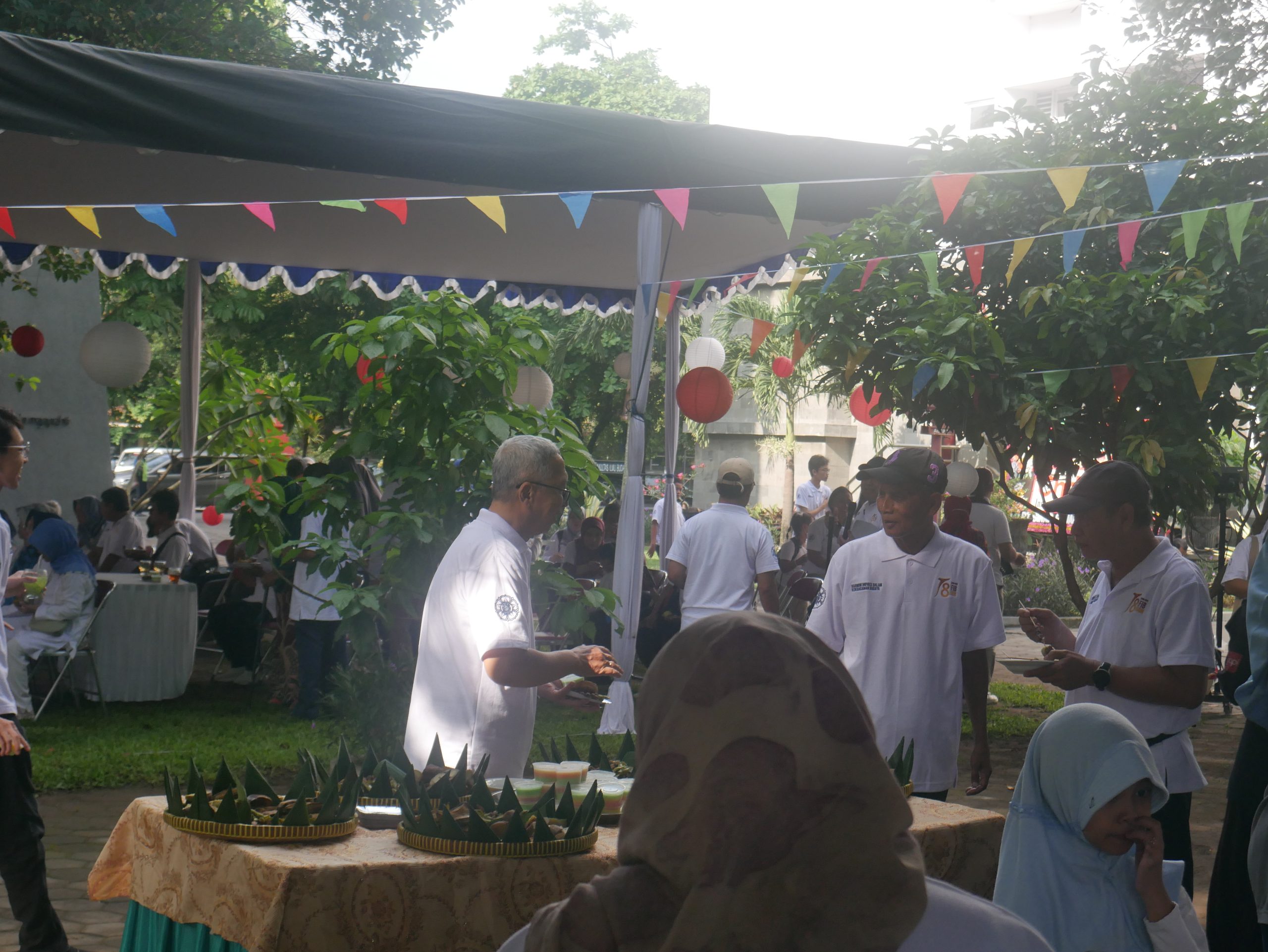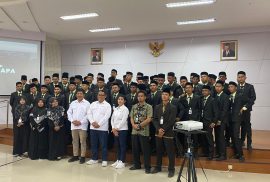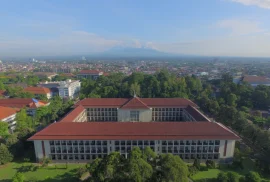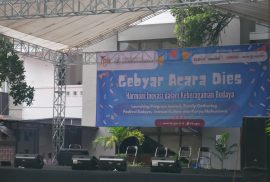SDGs 4: Quality Education | SDGs 4: Cultural diversity | SDGs 4: Education | SDGs 8: Culture | SDGs 9: Access to the internet | SDGs 11: Cultural heritage | SDG 16: Peace justice and strong institutions | SDGs 16: Accountable institutions | SDGs 16: Education | SDGs 17: Partnerships for the Goals | SDGs 17: Global partnership
SDGs 16: Accountable institutions
SDG 4: Quality education | SDGs 4: Cultural diversity | SDGs 4: Enrolment | SDGs 4: Equal access | SDG 10: Reduced inequality | SDGs 10: Culture | SDGs 10: Education | SDG 11: Sustainable cities and communities | SDGs 11: Adaptable | SDG 16: Peace, justice and strong institutions | SDGs 16: Accountable institutions | SDGs 16: Education
The month of Ramadan has passed. Visits from outside the region to the Faculty of Humanities, Universitas Gadjah Mada are busy again. This time, on April 29, 2024 at 9 am, the faculty was visited by younger siblings who came all the way from Aceh, namely the modern boarding school MA Teuku Chiek Oemar Diyan. Wearing polite and closed clothes typical of the city of Mecca portico in green and combined with black suits and caps for men, 104 students and 6 accompanying teachers entered the auditorium in an orderly and enthusiastic manner while taking pictures and recording videos. The MC opened and warmly welcomed their arrival, followed by remarks from school representatives. “From the tip of Aceh, the first time to Java, many cultural differences are found so that we have to adapt a lot. Therefore, please apologize if there are mistakes made by our students,” said one of the accompanying teachers who gave a speech.
Next, they watched video screenings and quizzes. This session not only practiced concentration, but also increased knowledge about Universitas Gadjah Mada and the Faculty of Cultural Sciences in particular. To add more insight to the students, an additional session was provided, namely a sharing session of Prof. Irwan’s journey from Aceh to become a professor at UGM. He gave motivation that villagers can go international if they go to UGM. FIB also does not see where we are from because everyone is diverse, “Acehnese nutrition is still good because they eat fish, which is lacking in business, so let’s try and Insha Allah we will meet again here,” he said. Mas Yusuf, who is the staff of the academic and student affairs department, also conveyed some more specific things about academics, and introduced the web which has complete information. The students’ enthusiasm was even more apparent during the questioning session. The event was closed with a very entertaining performance from the students.
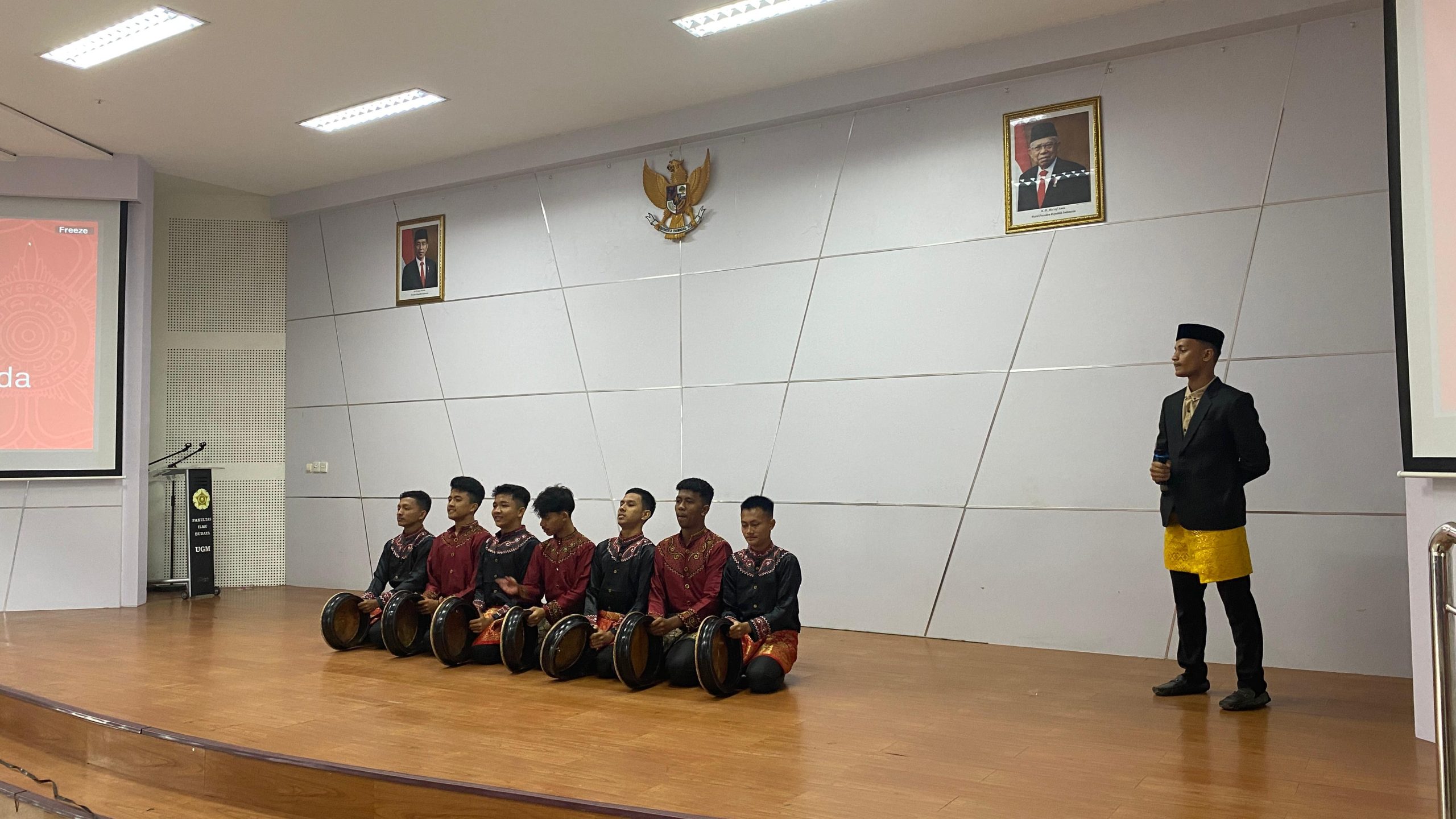
SDG 4: Quality education | SDGs 4: Education for sustainability | SDG 8: Decent work and economic growth | SDGs 8: Decent work for all | SDGs 9: Affordable access | SDG 10: Reduced inequalities | SDGs 10: Education | SDG 11: Sustainable cities and communities | SDGs 11: Adaptable | SDG 16: Peace, justice and strong institutions | SDGs 16: Accountable institutions
The happy graduates and their parents were present at the Raden Soegondo Building Auditorium, Faculty of Cultural Sciences UGM / to take part in the Mangayubagya Graduate Program Graduate Program Third period Academic Year 2023/2024 on April 24, 2024. As usual before starting the event, do not forget the Master of Ceremony, which at that time was entrusted to Vivin and Diyah, conveyed some information for safety and smoothness during the event. The audience was then asked to stand while the Dean, Deputy Dean, Head of Department, and Head of Postgraduate Study Program, Faculty of Cultural Sciences, Universitas Gadjah Mada entered the ceremony room. After all attendees were in the room, the MC welcomed everyone.
The event began with several speeches. The first speech, from the Dean of the Faculty of Cultural Sciences, will be represented by the Vice Dean for Academic and Student Affairs, Dr. Nur Saktiningrum, M.Hum. The second speech will be delivered by the Deputy Graduate of the Middle East Cultural Studies Master Program, Br. Rafika Fidlaty Zulfa, M.A. The event continued with the presentation of Beksan Nirbaya Dance performed by FIB UGM students who are members of the Sastro Obah student activity unit. Beksan Nirbaya or Edan-edanan dance is one of dozens of dances in the Special Region of Yogyakarta. The dance is named “Edan-edanan Nirbaya Dance”. “Nir” which means reject, “Baya” which means danger so that this dance is interpreted as a dance that rejects danger, especially during the wedding procession or other major events. With four dancers and pairs, this dance was created not only as a ritual to repel bad luck, but also as entertainment.
The next event was the submission of graduation documents consisting of English diplomas and transcripts. The graduation documents were submitted by each Head of Study Program to the graduates. The graduates came forward in an orderly manner to receive the graduation documents followed by a group photo. Before closing, the event was paused for a moment to pray for protection and safety for us and goodness for the Faculty of Cultural Sciences. The joint prayer was led by Br. Cahya Daru, M.A. Finally, the Dean, Deputy Deans, Heads of Departments, and Heads of Postgraduate Study Programs, Faculty of Sciences followed by graduates and parents / guardians were allowed to leave the ceremony room. The organizing committee would like to thank you for your presence in this mangayubagya event.
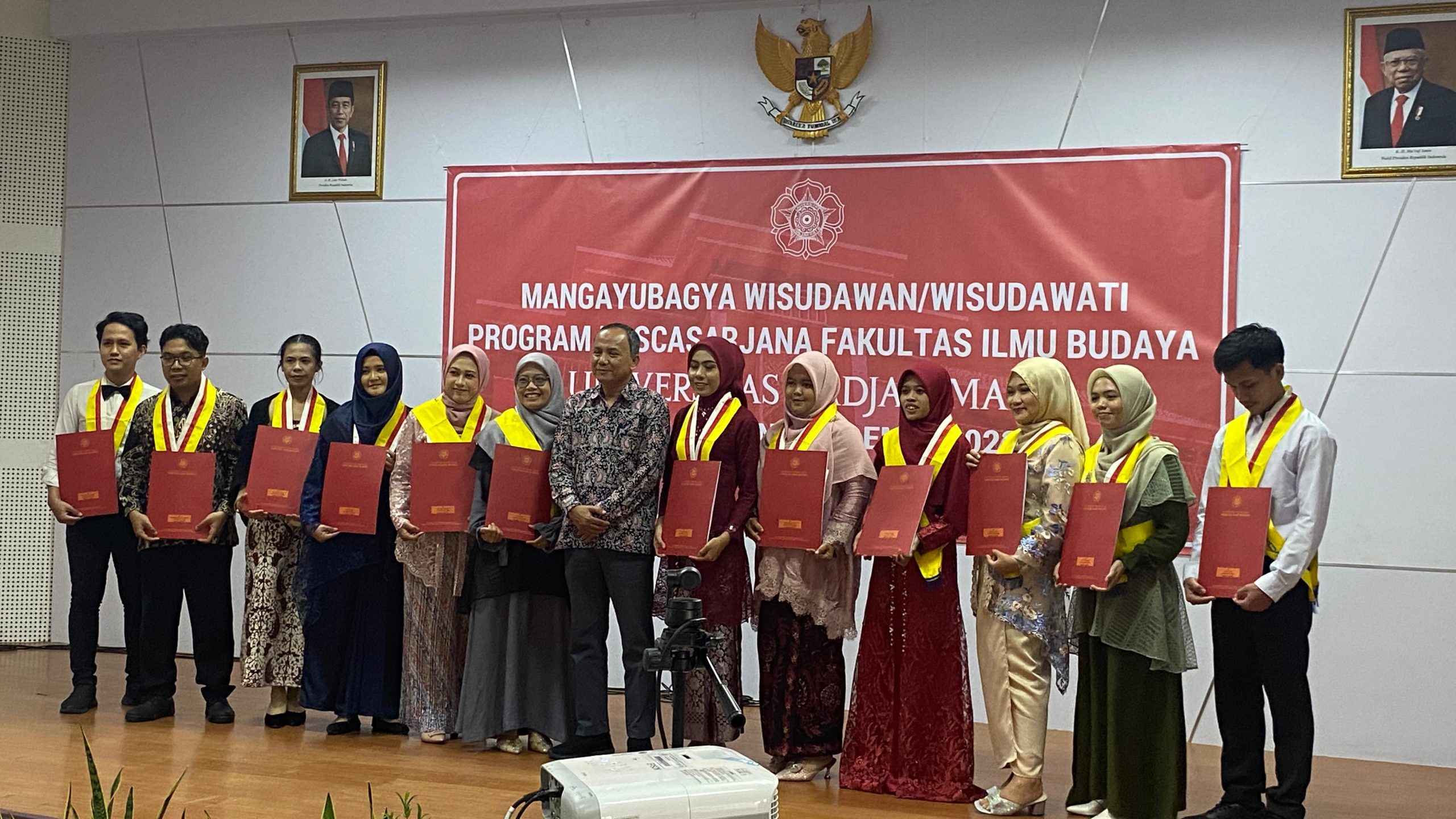
SDG 4: Quality education | SDGs 4: Education in developing | SDGs 4: Education | SDGs 4: Access to education | SDG 8: Decent work and economic growth | SDGs 8: Creativity and innovation | SDG 9: Industry, innovation and infrastructure | SDGs 9: Affordable access | SDG 16: Peace, justice and strong institutions | SDGs 16: Accountable institutions | SDGs 16: Education | SDG 17: Partnerships for the goals | SDGs 17: Capacity building | SDGs 17: Fostering innovation
Just as additional information about the position of the Anthropology department of FIB UGM, in the middle of a collection of anthropology departments in the world, is now at level 51-100 (top 100). The question is: approximately whether the UGM Anthropology department is at the same level as anthropology departments at other universities? The answer is very surprising. UGM Department of Anthropology is on the same level as Anthropology departments at the following universities: Monash University (Australia), John Hopkins University, Northwestern University (USA), Radboud University in Nijmegen (Netherlands), City University of New York (CUNY) where Eric Wolf is a famous anthropology figure; a famous Anthropology figure, University of California San Diego, University of North Carolina (where James Peacock, who researched Muhammadiyah in Yogya), Oslo University, Bergen University (where Fredrik Barth a famous Norwegian anthropologist), University of Illinois (where Edward Bruner, who researched Batak people, and many more anthropology departments in other famous universities. Congratulations to our Anthropology friends!
Dean of Faculty of Arts UGM, Prof. Dr. Setiadi, said the achievement of Anthropology UGM was certainly very proud considering it is very rare for study programs in Indonesia to enter the top 100 in the world. “For Faculty of Cultural Sciences, this achievement becomes a trigger as well as learning so that other study programs can enter the same category,” Setiadi told reporters on Saturday (13/4). He acknowledged the success of Anthropology Study Program, Faculty of Cultural Sciences UGM in being ranked 51 QS World University Rankings (WUR) by Subject for 2024 is inseparable from the excellence of academic assessment, publications, number of citations, impact to the quality of graduates produced. According to him, the support provided by FIB UGM in the availability of research funds, opening up opportunities for cooperation, and facilitating the development of human resources for further studies greatly supports this study program to be more advanced and international. “Moreover, we at FIB already have a policy to determine lecturers who must graduate from doctoral degree and recruitment of new lecturers must also have doctoral degrees,” he said.
SDG 3: Good health and well-being | SDG 10: Reduced inequalities | SDGs 10: Children | SDG 16: Peace, justice, and strong institutions | SDGs 16: Accountable institutions
The highlight of the activitiy series celebrating the 78th Anniversary of the Faculty of Cultural Sciences, Gadjah Mada University, was successfully held with great fanfare on Saturday 2nd March 2024 in the faculty yard. This event has a unique name, namely GADIES, which is an abbreviation for Gebyar Acara Dies. The attendees consisting of lecturers, staff and their families, began to come to the event from around 6.30 am and filled in the guest book which would then be used as a door prize draw. Before announcing the door prizes, the first event started with a healthy walk along the route: Faculty of Cultural Sciences – Campus Mosque – Faculty of Psychology – Faculty of Law – Rectorate Building – then back to the Faculty of Cultural Sciences. The faculty provides invited guests with a variety of food and drinks ranging from satay, meatballs, pecel rice, fruit ice, tea, and various kinds of boiled food. Eating food without a performance seems incomplete, that’s when Sastro Obah’s appearance makes the atmosphere more interesting.

The event was officially opened with speechfrom the Dean of the Faculty of Cultural Sciences, Prof. Dr. Setiadi, S.Sos., M.Si.,. Not only did he open the event, but also he launched the superior programs of the Faculty of Cultural Sciences, such as PERPUSTRA (Perpustakaan Sastra), POSBINDU, EOFIICE, and DIGLIB. The event became even more lively with further performances from other various cool performers, namely poetry readings by students of Indonesian Literature, Karawitan Dharma Wanita, Prasasti, Rampoe, and Korean Fan Dance. A door prize draw was announced between performances. The prizes prepared varied from the smallest, such as plates, to the largest, such as bicycles. At the same time, children from lecturers and staff from grades 1 to 6 of elementary school competed in a coloring and drawing competition held in the hallway of the Soegondo building.
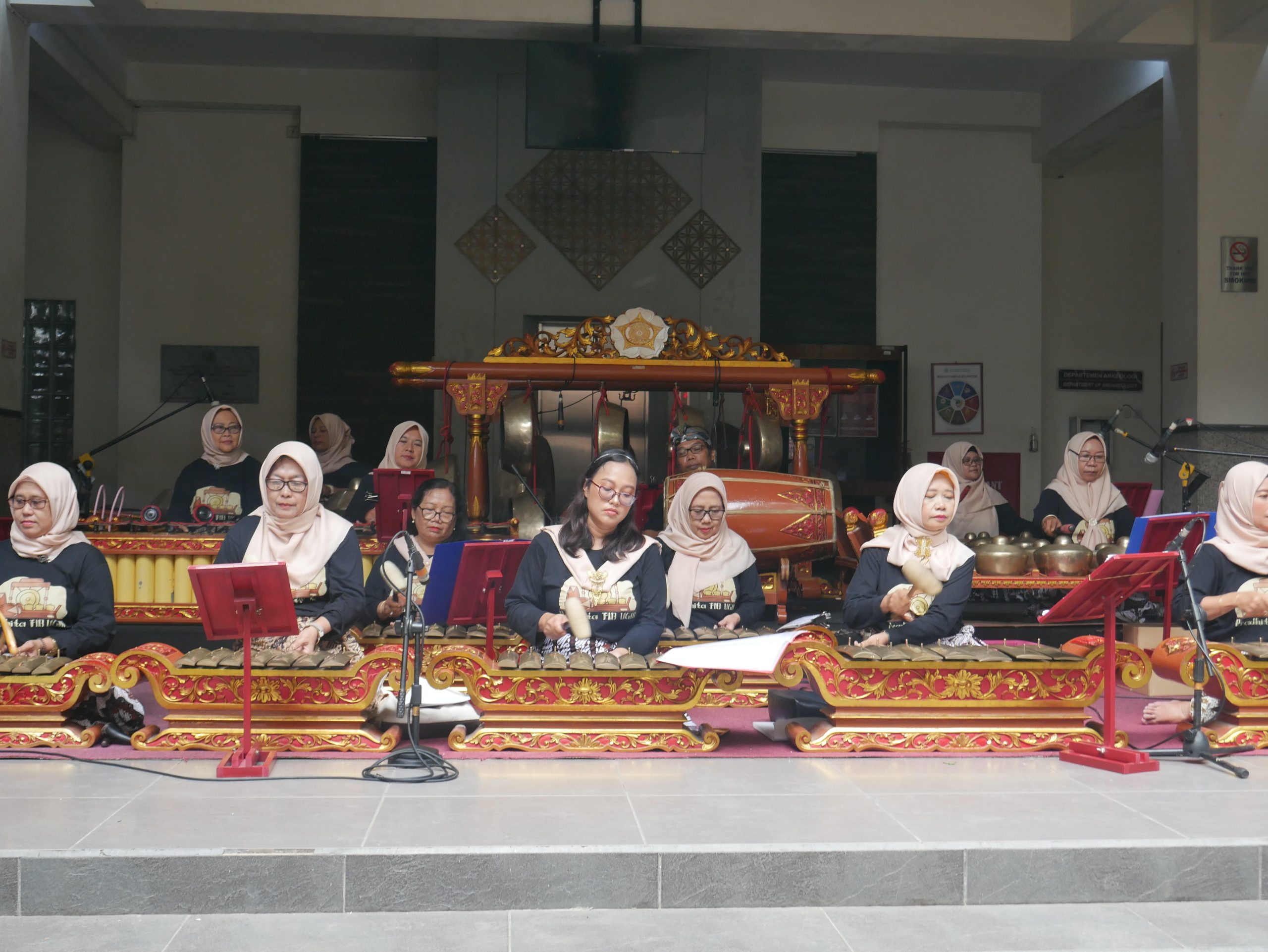
Beside the free food booths that the committee had provided for invited guests, there were also other booths that enliven the event such as exhibition booths for study programs, sponsors, junk food, accessories, health tests by POSBINDU, books by PERPUSTRA, and even a 360 degrees photo booth which became the favorite among guests, especially women. When the sun was starting to sting, it indicated that it was starting to be noon and that meant that GADIES had reached the end of the event. At that time, the winners of the badminton, cleanliness and coloring/drawing competitions were announced. The event then closed with a music group entertainment performance with singers chosen at random or who volunteered to come on stage to show their singing talents.
